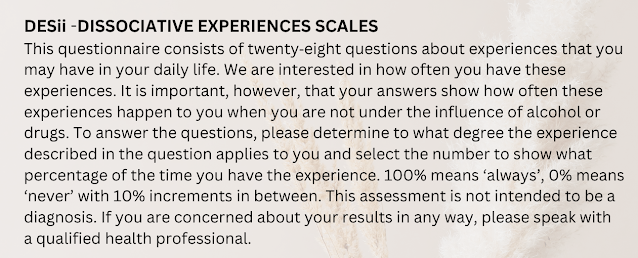|
Dissociative Disorders Packet This packet contains information on:
|
|
|
|
"The most commonly used screening tool for dissociation is the Dissociative Experiences Scale. It is most useful for DID and misses many cases of dissociative amnesia, depersonalization/derealization, and more subtle identity intrusions such as those found in other specified dissociative disorder subtype 1 (OSSD-1); however, it can nonetheless be helpful for recognizing that dissociation may be present." |
Mental Status“An Office Mental Status Examination For Complex Chronic Dissociative Symptoms And Multiple Personality Disorder” Richard Loewenstein, MD google form |

DIS-Q QUESTIONNAIRE for registered clients
Cambridge Depersonalization Scale PDF
Other instruments that will not be discussed here include the following: the Child/Adolescent and the Child Dissociative Checklists (screening tools for children and adolescents); the Clinician Administered Dissociative States Scale (used to measure dissociative states at discrete points in time); and the Questionnaire of Experiences of Dissociation (QED), Dissociation Questionnaire (DIS-Q), Somatoform Dissociation Questionnaire (SDQ-20), and the Adolescent Dissociative Experiences Scale (ADES) (all of which are self-report measures of dissociation). Screening tools for trauma and posttraumatic stress may also be helpful. Examples include the Life Events Checklist for DSM-5 (LEC-5), PTSD Checklist for DSM-5 (PCL-5), and UCLA Child/Adolescent PTSD Reaction Index for DSM-5."
Also
- Dissociative Experiences Scale - a 28-item self-report instrument whose items primarily tap the absorption of outside information, use of imagination depersonalization, derealization, and amnesia.[12]
- Dissociation Questionnaire - 63 questions that measure identity confusion and fragmentation, loss of control, amnesia, and absorption.
- Difficulties in Emotion Regulation Scale (DERS) - 36-question subjective questions around challenges in goal-directed work, impulsivity, emotional responses to situations, ability to self-regulate emotions, etc.[13]



.png)









.png)
.png)


.png)

.png)










.png)



.png)
.png)















0 Comments
Thank you for commenting! Jane